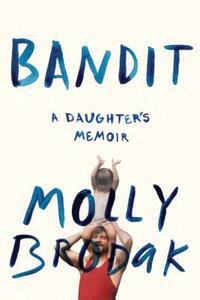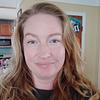Take a photo of a barcode or cover
emotional
reflective
sad
slow-paced
I tore through this book immediately after reading Blake Butler's "Molly".
Before Molly' suicide it may have been easier to see this "Daughter's Memoir" as a story about Molly's dad and about Molly surviving her family. I think people wanted to read optimism into it. After all that comes out in Blake Butler's "Molly" I found many passages in Bandit that seem prescient, as if Molly were gesturing towards her depths of complexity even while lulling us with beautiful language. Molly's dad nearly fooled everyone. Molly too?
I am absolutely fascinated by Molly Brodak's powers as a writer and human, and in bridging the gap between the deep admiration I have for hr and finding empathy for what I must now see - or guess at - was lacking.
Before Molly' suicide it may have been easier to see this "Daughter's Memoir" as a story about Molly's dad and about Molly surviving her family. I think people wanted to read optimism into it. After all that comes out in Blake Butler's "Molly" I found many passages in Bandit that seem prescient, as if Molly were gesturing towards her depths of complexity even while lulling us with beautiful language. Molly's dad nearly fooled everyone. Molly too?
I am absolutely fascinated by Molly Brodak's powers as a writer and human, and in bridging the gap between the deep admiration I have for hr and finding empathy for what I must now see - or guess at - was lacking.
i enjoyed this story and reading about detroit. but the audiobook narrator was insufferable
After reading Blake Butler's book Molly, I wanted to know more about Molly's own thoughts and experiences, not filtered through the lens of Blake. I've been having a hard time finding the words for how I feel about this book — I came away with a tenderness, compassion, and better understanding of Molly. Paraphrasing what this book is about really doesn't do the totality of it justice, so these are just a few thoughts I feel like I can put into words.
The title of this book, Bandit, is a reference to Molly's father robbing banks during her childhood. But it's also a reference to the time, resources, and care that he stole from his family due to his selfish actions. Because of him, Molly's childhood was tumultuous and unstable. Through it all she develops a strong will to work hard and become a different person from her father, while also showing us the ways in which she may not be so different — admitting to acting out on shadowy impulses like stealing. It was perhaps a subconscious way to connect to her father, to understand his actions, to make herself known: "I know a liar wants to be known," she writes. "I know a criminal wants to be caught, because it is the only way of being known."
I loved the way the book was structured. It jumps around in time and topics but never feels disjointed or scattered. There's a poeticism to the way she approaches her writing, which makes sense since she is first and foremost a poet, and she writes about how poetry gave her great comfort during uncertain times in her life.
Some passages left me absolutely gutted: her beautiful meditation on death and the circle of life while on a solo biking trip (which has even heavier meaning knowing the details of her death by suicide in 2020), her description of "headlessness" after the removal of the tumor on her brain, and her contemplations on addiction and mental illness. I wanted to quote some of these passages but I don't think sharing them context is helpful. There's an organic building on themes that happens in this book, where the topics hold so much more power in their totality.
If you've read Molly, I think this book is an important companion piece to get the full picture of the bright and complicated person that Molly was. I'll be thinking about this one for a long time.
The title of this book, Bandit, is a reference to Molly's father robbing banks during her childhood. But it's also a reference to the time, resources, and care that he stole from his family due to his selfish actions. Because of him, Molly's childhood was tumultuous and unstable. Through it all she develops a strong will to work hard and become a different person from her father, while also showing us the ways in which she may not be so different — admitting to acting out on shadowy impulses like stealing. It was perhaps a subconscious way to connect to her father, to understand his actions, to make herself known: "I know a liar wants to be known," she writes. "I know a criminal wants to be caught, because it is the only way of being known."
I loved the way the book was structured. It jumps around in time and topics but never feels disjointed or scattered. There's a poeticism to the way she approaches her writing, which makes sense since she is first and foremost a poet, and she writes about how poetry gave her great comfort during uncertain times in her life.
Some passages left me absolutely gutted: her beautiful meditation on death and the circle of life while on a solo biking trip (which has even heavier meaning knowing the details of her death by suicide in 2020), her description of "headlessness" after the removal of the tumor on her brain, and her contemplations on addiction and mental illness. I wanted to quote some of these passages but I don't think sharing them context is helpful. There's an organic building on themes that happens in this book, where the topics hold so much more power in their totality.
If you've read Molly, I think this book is an important companion piece to get the full picture of the bright and complicated person that Molly was. I'll be thinking about this one for a long time.
Beautifully written, raw, and powerful, this book was hard to finish because it was so honest and heartbreaking. However, it was also hard to finish because some of her analysis and insight into her experiences feel convoluted and jumbled. Brodak has a unique voice and I hope to see her develop her lyricism and storytelling skills in future books.
challenging
dark
emotional
reflective
medium-paced
3.5 stars rounded up. My dad worked with the "Mario Bandit" at GM in the 80s and 90s, so as soon as I found out that this book was written by his daughter, I had to read it! Recognizing the places named in the book, and the connection of the Detroit area to GM, Ford and other automakers created a personal connection for me; however it was the author's writing and phrasing that I liked the most. I was bummed to come across this book through an article about a book her husband wrote about her life and suicide- a sad story indeed. I will be reading that as well as her poetry collections soon.
challenging
funny
inspiring
reflective
sad
fast-paced
3.5 to 4 stars.
Molly's dad was a serial bank robber, thief and gambler. For the most part, this was an interesting book. It seemed a little self indulgent. But, I suppose that is the point of a memoir. Molly waxes philophical at times and seems to try to hard to make her life make sense. She studied the great philosphical minds, so I am guessing she is trying to connect or give her self a reason for her fathers actions.
Molly's dad was a serial bank robber, thief and gambler. For the most part, this was an interesting book. It seemed a little self indulgent. But, I suppose that is the point of a memoir. Molly waxes philophical at times and seems to try to hard to make her life make sense. She studied the great philosphical minds, so I am guessing she is trying to connect or give her self a reason for her fathers actions.
challenging
dark
emotional
reflective
sad
medium-paced
Rest in peace, Molly Brodak.
This story details very honestly the childhood of someone who passed by suicide in adulthood. Knowing that makes it a bit hard to read.



